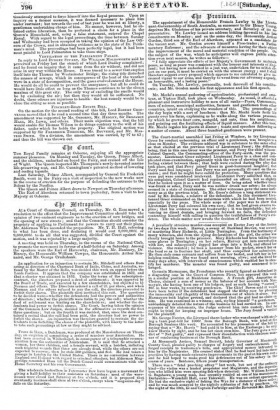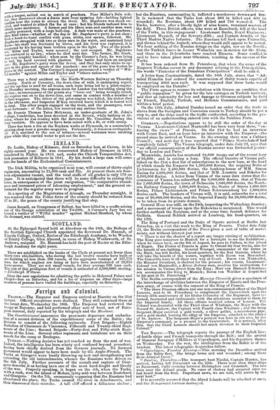VtlIttliittl
The appointment of the Honourable Francis Lawley to. Liente,
nant-Governorship of South Australia, as suceessor to Sir Hnry Young, deprives Mr. Gladstone of his private secretary, and Beverley of its re. presentative. Mr. Lawley issued an address bidding farewell to his lase constituents on Monday ; and on the same day, the Honourable Arthur Gordon, third son of the Earl of Aberdeen, appeared as a candidate fes the vacant seat.. Mr. Gordon avows himself a Free-trader ; a Parlias mentary Reformer ; and' the advocate of measures having for their object the improvement of the moral and material condition of the people. Oa the subject of the war, which he anticipates will, engross pnblic atten. tion even next session, he writes as follows- " I fully appreciate the efforts of her Majesty's_ Government to maintain peace, so long as peace was consistent with the honour and interests of Rim. land ; but having now embarked in a just war, undertaken for no selfish 4. jest on our part, it must be carried on with the utmost. energy ' • and I shall therefore support every proposal which appears to me calculated to give in. creased vigour to our arms, and thereby to wrest from our adversary a speedy, an honourable, and a lasting peace."
On Tuesday, Mr. Lawlcy, personally, took farewell of his constitus eats ; and Mr. Gordon made his first appearance and his first speech.
Mr. Mechi's annual gathering of agriculturists, professional and anis. teur, at Tiptree Hall, took place on Wednesday. As usual, it afforded a pleasant and instructive holiday to men of all ranks—Peers, Commoners, men of science, municipal authorities, farmers and gentlemen from other countries, intent on studying the wonders of this. The proceedings of the day begin with a sort of luncheon : then Mr. Medd leads forth' his
guests over his farm, explaining as he walks along the various processes .
by which he grows finer corn, mangold, and oats, than his neighbours; and pointing out the fertilizing effects of liquid manure. After this tour, Mr. Meehi regales his guests at dinner ; toasts and speeches following as a matter of course. About three hundred gentlemen were present.
The Court-martial assembled last Friday at Windsor, to try Lieutenant Greer for conduct unbecoming an officer and a gentleman, was brought to a close on Monday. The evidence-adduced was in substance to the same effect as that elicited at the previous trial of lieutenant Perry ; the difference being, that in this case Greer was the prisoner, and Perry the chief winless: Colonel Garrett, the Commanding-officer of the Forty-sixth, was the pro- secutor. Lieutenant Greer subjected Lieutenant Perry to a close and com- plicated cross-examination, apparently with the view of showing that no bad feeling existed between them that both were excited during the play that took place, and that Perryjoined Greer in good-humoured laughter; that Perry used foul language ; that Perry was not personally ill-used on the oc- casion ; and that he might have called for protection...Many questions that were put were considered irrelevant. Lieutenant Perry adinitted 'that, on his complaint, Colonel Garrett had reprimanded an officer, but 'so slightly that he looked upon it as a matter of form. On' being asked whether Greer Was drunk or sober, Perry said he was neither drunk nor sober; be always seemed in a state of drunkenness. The other witnesses gave the same testi- mony as at the previous trial. In Mr. Greer'a defence a long statement was read by Mr. Bullock, a relative of the defendant. In this document Lieu- tenant Greer commented on the unfairness with which he had, been treated, especially by the press. The whole scope of the paper was to show that Lieutenant Perry had coloured his own ease; that he had given evasive re- plies ; that his evidence was not trustworthy ; it was improbable; but ad- vancing no direct denials, and bringing forward no facts, 'the defendant contenting himself with calling in question the truthfulness of 'Perry's evi- dence. The whole matter now awaits the decision of Lord Ilardinge.'
A peculiarly atrocious murder-ease occupied an Exeter Jury at the Assizcs for two days this week. Harvey, a sweep of Buckland Brewer, was accused of murdering Mary Richards, at Little Torrington. From the testimony of many witnesses, and from the dying declarations of the girl, the crime was clearly brought home to the prisoner. Mary Richards had been taking home some gloves to Torrington ; on her return, Harvey got into conversation with her, and subsequently dogged her steps into a fieTd, and offered her violence. She resisted ; he took a hammer from his pockets struck her on the head so as to fracture her skull, and thus compelled her submission. He then stole some currants and saffron from her basket, and left her in her helpless condition. She was found' next morning, alive ; and she lived for many days after, with intervals of consciousness which enabled her to iden- tify her murderer. The monster was found guilty, and sentenced to he hanged.
Germain Marmaysee, the Frenchman who recently figured as defendant in a disgusting case in the Court of Common Pleas, has appeared this week in a similar position at Maidstone Assizes. A' French girl, Augustine de Choicy, claimed a sum of money, as the balance of her account with Max;maysee, she having been one of his lodgers, and as such having " earned '
801. in four weeks, by receiving gentlemen. The Chief Baron said it would have been better if the defendant- bad stopped the 0Ithy case by pleading the immorality end illegality of the transactions out of which it arose. But Marmaysee took higher ground, and declared that the girl had no claim on him. He was examined as a witness; and, styling himself "a gentleman,!' unblushingly detailed the nature of the business he had,carried on. In con- sequence of his statements, the Judge ordered him into custody, that he might be tried for keeping an improper house. The Jury found a verdict for the plaintiff. Mr. George Forster, the Liverpool share-broker who was charged with steal- ing a bank post-bill for 10001. from the Borough Bank, was tried at the Borough Sessions this week. He accounted for his possession of the bill by saying that a " Mr. Harris " had paid it to him; at the Exchange ; be only se
knew Harris by sight, and he has not since seen him. The Jury gave a ver- dict of " Not guilty," and expressed their dissatisfaction with theloom man' ner of conducting business at the Borough Bank. At Monmouth Assizes, Samuel Barrett, lately Governor of Monmouth County Gaol, pleaded guilty to charges of forgery =and embezzlement xe forged receipts to tradesmen's bills, and appropriated money intrusted to him by the Magistrates. His counsel stated that belied been led into these practices by having made extensive improvements in the gaol at his own cost; and he had hoped to make good his deficiencies out of his salary in the course of years. Sentence, fifteen years' transportation. There was a " fatal poaching affray" last week, but not of the ordinary kind—the victim was a landed proprietor and Magistrate, and the depreda- tors who killed him were spearingfish when detected. Mr. William Leonard G. Bagshasve,"a young man, had recently resided at one of his mansions Derbyshire—Wormbill. Hall, near Tideswell. He was an ardent sportsman. He had the exclusive right of fishing the Wye for a distance of three miles; and he was much annoyed by the, nightly robberies of fish by poachers. Oa the night of the 19th, he and Captain Partridge and the Reverend Mr. Belford, with a keeper, sallied out in search o4 poacher& Near Miller's Dale toll- bar, they disoovered about i dozen. Min fbusy epelering fish—holding lighted codes near the water to attract the trout. Mr. Bagshawe was much ex- ! ited, and matted toattack the foe at once ; but his friende induced him to obtain more assistance. A farmer and his three sons and another man were edify procured, with a large bull-dog. A dash was made at the poachers; they fired twice—whether at the dog or Mr. Bagahawe's party is not clear ; then a hand-to-hand conflict with guns, sticks, and spears, followed. Mr. asgshawe struggled with two or three men in the water, and sustained fatal hurts—his skull was fractured by blows,, and his liver was ruptured, it is fuggested by his having been trodden upon in the fight. Two of the poach- ers, Milne and Taylor, were secured ; the rest escaped. Mr. Bagshawo was conveyed to an inn ; where he died next day. The farmer, Mr. Slack, was very roughly handled : when seen by the Coroner's Jury, he was lying iu bed, his head covered with plasters. The battle had been an unequal we: Mr. Bagshawe's party were the fewer, and they had only sticks to op- pose to the gene and spears of the poachers : one of the guns was beaten to Feces in the contest. The Coroner's inquest pronounced a verdict of " Wil- ful murder" agairtht Mine and Taylor and "others unknown."
There was a fatal accident on the North-Western Railway on Thursday morning. North of Coventry, the down-line of rails is undergoing repair, and the up-line is used for all trains, each train being led by a pilot-engine. On Thursday morning, the express-train for London was travelling along the uteline ; in consequence of the points at a " turn-out " being wrongly closed, the express ran on to the down-line, and came in contact with a number of ballast-waggons. The driver of the pilot-engine was killed, his stoker died in the afternoon, and Inspector M'Kay received hurts which it is feared will be fatal.. The other people engaged on the train, and the passengers, were more fortunate : of the latter, few received any serious hurts.
Mr. Francis Thomas Yates Molyneux, an under-graduate of St. John's College, Cambridge, has been drowned in the Severn, while bathing at Al- reley, where he was reading with the Reverend Mr. 'Considine during the long vacation. He appears to have been seized with a fit, or with cramp.
There has been a fire at the Keyham works at Plymouth, in a contractor's planing:shop near a powder-magazine. Fortunately, it was soon extinguish- ed. It is ascribed to the use of tobacco—several workmen were smoking pipes while they carried water to put out the fire.



































 Previous page
Previous page